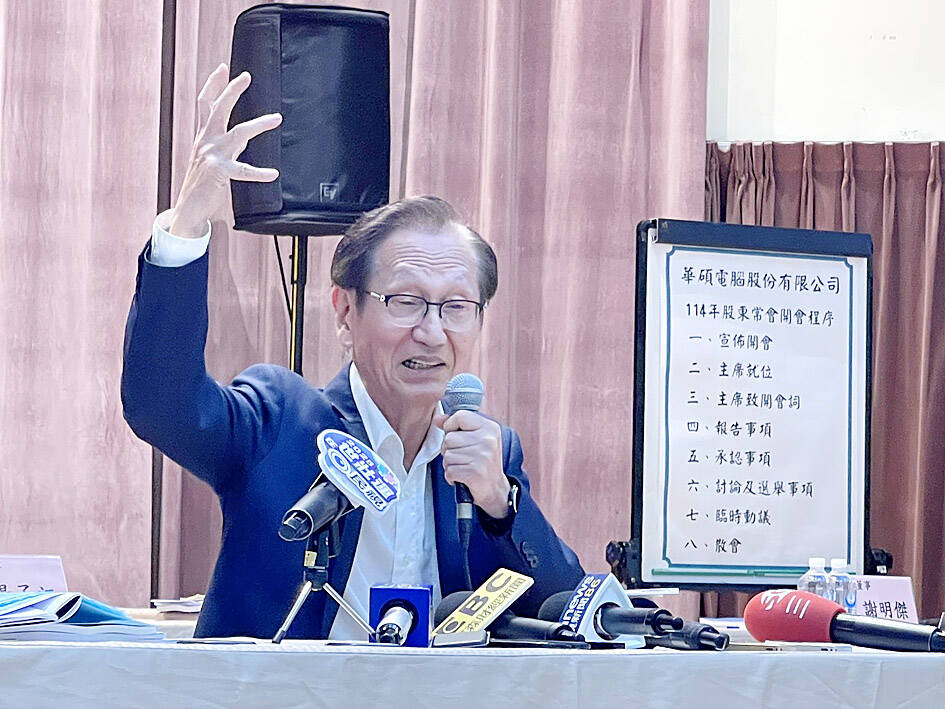PC vendor Asustek Computer Inc (華碩) yesterday said it expects closer collaboration with Nvidia Corp, after the latter announced plans to build its new Taiwan office in the Beitou-Shilin Technology Park (北投士林科技園區) in Taipei.
However, the company hopes Nvidia would not poach its talent as the artificial intelligence (AI) chip company is “too attractive,” Asustek chairman Jonney Shih (施崇棠) told reporters after its annual shareholders’ meeting.
Shih also told shareholders that the company expects continued growth in server business this year, after revenue in the segment last year increased fivefold from a year earlier.

Photo: Vanessa Cho, Taipei Times
Earlier this month, the company projected that servers would contribute about 15 percent of its revenue this year.
Shih described the current AI trend as “the poor man’s Chinese kung fu,” referring to the emergence of cost-efficient AI models developed in China that enable effective and resource-saving applications.
Shih took mixture-of-experts models as an example, saying that they allow training and inferencing with relatively few parameters, helping to spur the development of smaller AI applications and launching a new industrial revolution.
AI is driving the revolution by directly producing intelligence, a process now called an “AI factory” or “intelligence manufacturing,” and which is expected to make the production process entirely autonomous, he said.
The scale and impact of AI are comparable to the revolution sparked by the invention of computers, which are now able to produce intelligence and regarded as “brains,” he said.
“This is an opportunity that you can only expect once in 100 years,” he said.
In the robotics sector, Shih said Asustek developed its Zenbo robot in the early stages, but faced challenges due to insufficient intelligence.
However, with the advancement of artificial general intelligence, language can now function as a semiotic system to enable general intelligence in AI, making the development of humanoid robots more viable, he said.
As for the potential impact of tariffs imposed by US President Donald Trump, Shih said the US president is highly “unpredictable,” and manufacturers should expect to face short-term pain.
Asustek’s key strategic goals this year include advancing AI-enabled products and services, such as PCs, servers, edge AI and AI of things applications, Shih said.
Shareholders yesterday approved the company’s plan to distribute a cash dividend of NT$34 per share, the highest in three years.
The company’s revenue last year grew 22 percent year-on-year to NT$587.1 billion (US$19.63 billion) and net profit surged 97 percent to NT$31.4 billion, or earnings per share of NT$42.

South Korea’s equity benchmark yesterday crossed a new milestone just a month after surpassing the once-unthinkable 5,000 mark as surging global memory demand powers the country’s biggest chipmakers. The KOSPI advanced as much as 2.6 percent to a record 6,123, with Samsung Electronics Co and SK Hynix Inc each gaining more than 2 percent. With the benchmark now up 45 percent this year, South Korea’s stock market capitalization has also moved past France’s, following last month’s overtaking of Germany’s. Long overlooked by foreign funds, despite being undervalued, South Korean stocks have now emerged as clear winners in the global market. The so-called “artificial intelligence

NEW IDENTITY: Known for its software, India has expanded into hardware, with its semiconductor industry growing from US$38bn in 2023 to US$45bn to US$50bn India on Saturday inaugurated its first semiconductor assembly and test facility, a milestone in the government’s push to reduce dependence on foreign chipmakers and stake a claim in a sector dominated by China. Indian Prime Minister Narendra Modi opened US firm Micron Technology Inc’s semiconductor assembly, test and packaging unit in his home state of Gujarat, hailing the “dawn of a new era” for India’s technology ambitions. “When young Indians look back in the future, they will see this decade as the turning point in our tech future,” Modi told the event, which was broadcast on his YouTube channel. The plant would convert

‘SEISMIC SHIFT’: The researcher forecast there would be about 1.1 billion mobile shipments this year, down from 1.26 billion the prior year and erasing years of gains The global smartphone market is expected to contract 12.9 percent this year due to the unprecedented memorychip shortage, marking “a crisis like no other,” researcher International Data Corp (IDC) said. The new forecast, a dramatic revision down from earlier estimates, gives the latest accounting of the ongoing memory crunch that is affecting every corner of the electronics industry. The demand for advanced memory to power artificial intelligence (AI) tasks has drained global supply until well into next year and jeopardizes the business model of many smartphone makers. IDC forecast about 1.1 billion mobile shipments this year, down from 1.26 billion the prior

People stand in a Pokemon store in Tokyo on Thursday. One of the world highest-grossing franchises is celebrated its 30th anniversary yesterday.